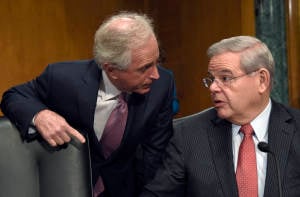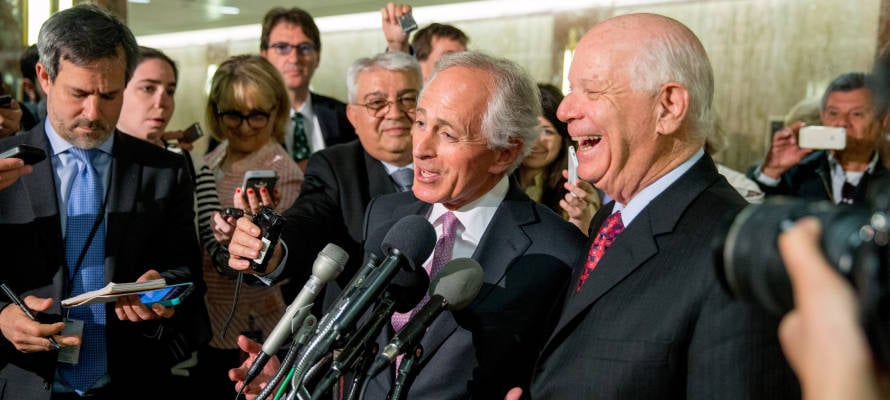
Senate Foreign Relations Committee Chairman Sen. Bob Corker, left, talks with the committee’s ranking member Sen. Robert Menendez. (AP/Susan Walsh, File)
As the Iran nuclear talks march toward the deadline in June, US Senators are working to convince their colleagues to give Congress full oversight on any final deal.
The US Senate begins debate this week on a bill empowering Congress to review and potentially reject any Iran nuclear deal.
President Barack Obama grudgingly backed the bill when Democrats joined Republicans in demanding a say on any final agreement, but even with widespread support in the Senate, proponents must first win a battle with some colleagues determined to change the legislation in ways that could cost them the Democratic support needed for passage.
The high-profile debate comes as negotiators from the US and five other nations are rushing to finalize an agreement by the end of June requiring Iran to curb its nuclear program in exchange for sanction relief.
U.S. Secretary of State John Kerry and his Iranian counterpart plan to meet Monday for the first time since they laid out the framework for a nuclear deal earlier this month. The State Department said Kerry and Iran’s Foreign Minister Mohammad Javad Zarif would meet in New York where the two are attending a conference at in New York on the nuclear non-proliferation treaty.
The bill before the Senate would block Obama from waiving congressional sanctions for at least 30 days while lawmakers weigh in. If 60 senators vote to disapprove of the deal, Obama would lose his waiver power altogether.
The president is betting that won’t happen. Even if Congress disapproves, Obama will almost certainly respond with a veto, which could prove hard to override.
The bill’s backers are trying to keep lawmakers focused on how it would give Congress a say on a critical national security issue. They say the measure is not meant to be about how Iran increasingly is wielding influence in the Middle East, its support of terrorist groups or human rights violations.
Some senators are proposing amendments to pressure Iran to end its support of extremist groups, stop threatening to destroy Israel and recognize its right to exist, and release U.S. citizens held in Iran.
Such amendments could scuttle an eventual deal and be difficult for Democrat to support.
If there is a final deal with Iran, Obama can use his executive authority to ease some sanctions on his own and work with the European Union and the United Nations to lift others. Obama also can waive sanctions that Congress has imposed on Iran, but he cannot formally lift them.
By: AP
